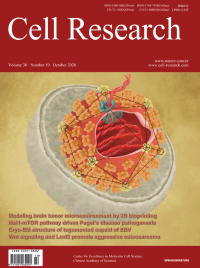
Advanced Search
Submit Manuscript
Advanced Search
Submit Manuscript
Volume 30, No 10, Oct 2020
ISSN: 1001-0602
EISSN: 1748-7838 2018
impact factor 17.848*
(Clarivate Analytics, 2019)
Volume 30 Issue 10, October 2020: 902-913
Whole-genome sequencing of 508 patients identifies key molecular features associated with poor prognosis in esophageal squamous cell carcinoma
Yongping Cui1,† , Hongyan Chen2,† , Ruibin Xi3,† , Heyang Cui4,5,† , Yahui Zhao2,† , Enwei Xu1,6,† , Ting Yan1 , Xiaomei Lu7 , Furong Huang2 , Pengzhou Kong1 , Yang Li2 , Xiaolin Zhu2 , Jiawei Wang8 , Wenjie Zhu8 , Jie Wang8 , Yanchun Ma1 , Yong Zhou1,5 , Shiping Guo9 , Ling Zhang1,5 , Yiqian Liu1,5 , Bin Wang5 , Yanfeng Xi6 , Ruifang Sun10 , Xiao Yu2 , Yuanfang Zhai1,5 , Fang Wang1 , Jian Yang1 , Bin Yang1,9 , Caixia Cheng1,11 , Jing Liu1 , Bin Song1 , Hongyi Li1 , Yi Wang1,5 , Yingchun Zhang1,5 , Xiaolong Cheng1 , Qimin Zhan4,5,* , Yanhong Li1,2,* , Zhihua Liu2,*
1Department of Pathology & Shanxi Key Laboratory of Carcinogenesis and Translational Research on Esophageal Cancer, Shanxi Medical University, Taiyuan, Shanxi 030001, China;Esophageal squamous cell carcinoma (ESCC) is a poor-prognosis cancer type with limited understanding of its molecular etiology. Using 508 ESCC genomes, we identified five novel significantly mutated genes and uncovered mutational signature clusters associated with metastasis and patients’ outcomes. Several functional assays implicated that NFE2L2 may act as a tumor suppressor in ESCC and that mutations in NFE2L2 probably impaired its tumor-suppressive function, or even conferred oncogenic activities. Additionally, we found that the NFE2L2 mutations were significantly associated with worse prognosis of ESCC. We also identified potential noncoding driver mutations including hotspot mutations in the promoter region of SLC35E2 that were correlated with worse survival. Approximately 5.9% and 15.2% of patients had high tumor mutation burden or actionable mutations, respectively, and may benefit from immunotherapy or targeted therapies. We found clinically relevant coding and noncoding genomic alterations and revealed three major subtypes that robustly predicted patients’ outcomes. Collectively, we report the largest dataset of genomic profiling of ESCC useful for developing ESCC-specific biomarkers for diagnosis and treatment.
https://doi.org/10.1038/s41422-020-0333-6